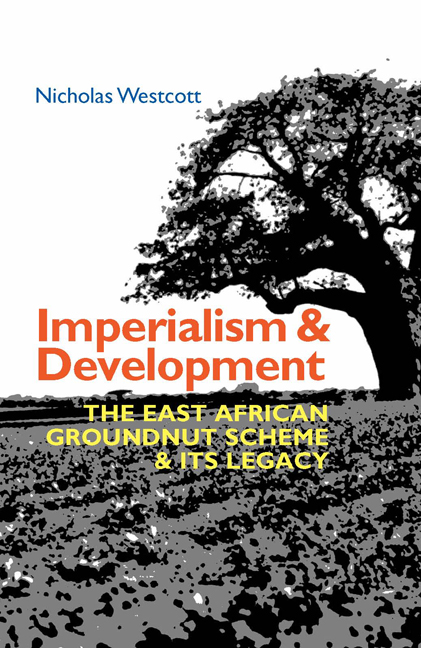Book contents
- Frontmatter
- Dedication
- Contents
- List of Illustrations
- List of Abbreviations
- Miscellaneous Frontmatter
- Preface and Acknowledgements
- Map
- Introduction
- 1 Austerity
- 2 A Scheme is Born
- 3 ‘The Poison of the Official Pen…’
- 4 The Groundnut Army
- 5 Beating about the Bush
- 6 The Overseas Food Corporation
- 7 1949: The Crisis
- 8 The Last Chance
- 9 A Sudden Death
- 10 Legacy and Lessons
- Bibliography
- Index
- Eastern African Studies
- Frontmatter
- Dedication
- Contents
- List of Illustrations
- List of Abbreviations
- Miscellaneous Frontmatter
- Preface and Acknowledgements
- Map
- Introduction
- 1 Austerity
- 2 A Scheme is Born
- 3 ‘The Poison of the Official Pen…’
- 4 The Groundnut Army
- 5 Beating about the Bush
- 6 The Overseas Food Corporation
- 7 1949: The Crisis
- 8 The Last Chance
- 9 A Sudden Death
- 10 Legacy and Lessons
- Bibliography
- Index
- Eastern African Studies
Summary
It was not a very Happy New Year for the OFC.
Dinner at the Café Royale
Harrison's plan, which acknowledged the true scale of the escalation of costs and the delay to the proposed timetable, came as a shock. Plummer and the OFC Board realised that anything along the lines he proposed would require more money than the Overseas Resources Development (ORD) Act provided, and therefore require Parliamentary legislation to amend the Act. Plummer and Strachey agreed that an informal approach direct to Stafford Cripps stood the best chance of success. A dinner was therefore arranged at the Café Royale, a legendary restaurant just off Piccadilly (beloved of Oscar Wilde and Winston Churchill), for Cripps, Strachey and the OFC Board on 4 January 1949.
Nobody knows exactly what was said at the dinner. But it is clear that when Plummer outlined the OFC's plan to Cripps, he categorically rejected any increase in the Corporation's spending limit of £55 million. Under no circumstances would the government introduce amending legislation. Any new plan for the scheme had to be found within that limit; they must ‘cut their coat according to their cloth’. The OFC Board were given until September to draw up a new plan within these limits, to allow it to take account of the 1949 harvest. But for now it left the scheme – once more – without a plan.
What made Cripps so intransigent? Three things would have been weighing on his mind. The scepticism of Treasury officials had been growing throughout 1948, and was increasingly borne out by the facts reported by the OFC itself. It was therefore only prudent to limit the government's liability. Secondly, though Strachey was right that the world price for oils and fats remained high, the Cabinet was no longer as obsessed with food as it had been the year before. Strachey's success in other areas, arranging long-term bulk contracts with producers for major staples, along with an easing of world shortages, had improved the position considerably. Thirdly, Attlee's Cabinet were increasingly preoccupied with other problems, above all the deteriorating international climate with the onset of the Cold War, and the deteriorating economic situation as the pressure on the pound continued to mount.
- Type
- Chapter
- Information
- Imperialism and DevelopmentThe East African Groundnut Scheme and its Legacy, pp. 132 - 153Publisher: Boydell & BrewerPrint publication year: 2020

